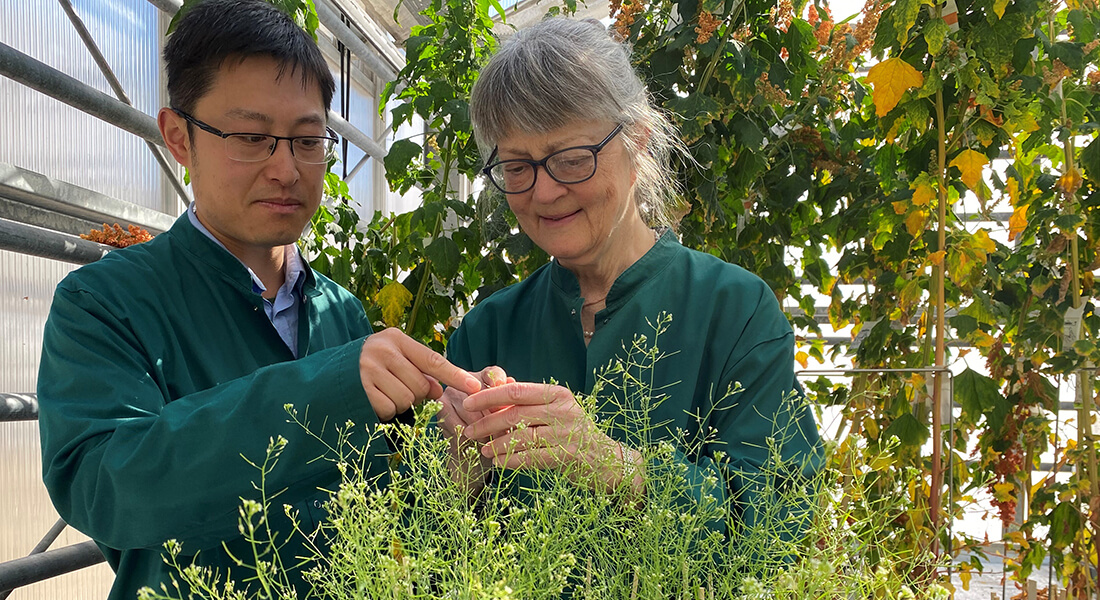Scientists turn protein-rich waste product into plant-based food
Scientists at University of Copenhagen have successfully developed a method to remove bitter compounds from protein-rich seeds of oilseed crop with potential as plant–based food. This breakthrough is published in the April issue of the prestigious science journal Nature.

Assistant professor Deyang Xu and Professor Barbara Ann Halkier in the green house of Department of Plant and Environmental Science
A research team from the University of Copenhagen has developed a method that can prevent the bitter defense compounds in rapeseed from accumulating in the seeds, which then can play an important role in the development of new sustainable foods.
Rapeseed is the world's third largest oilseed crop. When the oil is pressed from the seed, the residual product is a seedcake containing 30-40% protein. Today, the seed cake has limited use as animal feed, and is largely unexploited as food due to its high content of bitter defense compounds.
Assistant Professor Deyang Xu from the DynaMo Center, University of Copenhagen, and first author on the article explains that plants that cannot move when under attack, produce a multitude of defense compounds against pathogens and herbivores. This often makes them unsuitable for human consumption as exemplified with the strong pungent wasabi taste of seeds from the rapeseed crop. The defense compounds in rapeseed belong to a group called glucosinolates that are characteristic for the brassicaceous family, which also includes cabbages, broccoli and radishes.
"We have identified genes that can be used to remove the unwanted wasabi-like bitter taste from the seeds of the rapeseed plant. This was shown in the model plant thale cress that is closely related to rapeseed.'' explains Professor Barbara Ann Halkier, who heads the Center for Dynamic Molecular Interactions (DynaMo) at the University of Copenhagen.
Discovery blocks transport of bitter compounds to seeds
"Our research shows that the ‘umbelical cord’ that connects the seeds to the podwall in the rapeseed fruit is a factory for the seed-bound glucosinolates. Furthermore, we have identified three proteins critical for moving glucosinolates from the factory to the seeds. Our discovery enables us to block accumulation of the wasabi-like bitter compounds in the seeds of rapeseed by removing those proteins from the plant using a technology we call 'transport engineering'. Rapeseed and thale cress are closely related, and discovery can readily be transferred from the model plant to crop” explains Deyang Xu.
An additional advantage of the 'transport engineering' technology is that while the technology can prevent the bitter compounds from accumulating in the seeds, the defense compounds are still in the other parts of the plant that then remains resistant to attack.
Plant-based protein sources in the green transition
The climate crisis dictates an urgent need to reduce animal-based food, and in consequence plant-based food innovation is growing rapidly. Today, rapeseed protein constitutes approximately 50% of EU's locally-grown crude protein, with sunflower seeds, pulses, soybeans making up the rest. A rapeseed plant without wasabi-like glucosinolates in the seeds has great potential as source of plant-based food in the green transition. Moreover, rapeseed is an already-existing, locally-grown crop.
Long live basic research
The research that led to this discovery is the result of many years of dedicated work by scientists at the Dynamo Center. This was made possible due to long-lasting and substantial funding over 10-years from the Danish National Research Foundation to the DynaMo Center headed by Professor Barbara Ann Halkier, who states: "I cannot emphasize enough how important solid, long-term funding is. The grant enabled us to nerdily and thoroughly submerge ourselves in the details and make this scientific breakthrough".
